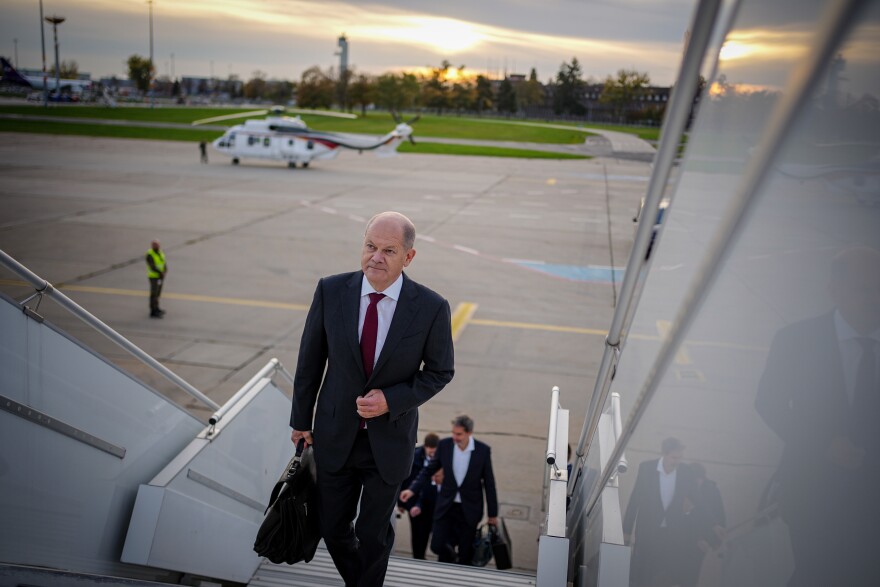HAMBURG, Germany — One of Europe's largest ports, Hamburg has excelled at trade since the Middle Ages. Back then, the city clubbed together with other ports along and beyond the Baltic coast to form the Hanseatic League, which dominated commerce for centuries.
Now the city's port is joining forces with a Chinese shipping giant. The state-owned China Ocean Shipping Co., known as COSCO, is about to buy a stake in a container terminal.
China has been Germany's largest trading partner for much of the past decade. German Chancellor Olaf Scholz pushed the COSCO deal through his cabinet last week, despite opposition from six key ministers. The chancellor tried to address their concerns about selling off critical infrastructure by reducing COSCO's stake from 35% to 24.9%. And while his cabinet reluctantly agreed to this slimmed-down deal, it remains unpopular.
Speaking on background, a senior U.S. State Department official said Wednesday that the U.S. had also strongly suggested that China not be permitted to get a controlling stake in the Hamburg port terminal.
While the deal is yet to be finalized, the timing of Scholz's cabinet approval of it has raised eyebrows in Berlin and other Western capitals. As Scholz heads to China to meet with President Xi Jinping on Friday, he is under political pressure at home, and from Washington, to rethink Berlin's relationship with Beijing. Scholz will be the first leader to visit China since Xi consolidated his power at last month's Chinese Communist Party Congress.
Lawmakers — both from his own government and the opposition — are afraid of making the same mistakes with Beijing that they made with Moscow, where they were overly dependent on an autocratic state for their economic well-being.
They are anxious to reduce Germany's economic dependency on China. But like Angela Merkel before him, Scholz is traveling to Beijing with a delegation of German CEOs, who are looking to continue business as usual.
Noah Barkin, who researches European-Chinese relations for the think tank Rhodium Group, says the COSCO-Hamburg deal implies Scholz is not listening to his own government.
"The optics are not great," Barkin says. "It appears that Scholz, shortly before heading to Beijing, is offering the Chinese government a gift."
Barkin says the COSCO deal undermines previous policy pledges.

"Scholz's government came in promising a new, tougher stance" on China, he says. "They're putting the finishing touches on a new China strategy which will focus on diversification away from China. And Scholz is sending signals in the opposite direction. So there are big questions abroad about where Germany really stands on China."
Scholz defends himself
In response to the widespread criticism and head-scratching, Scholz laid out his intentions in Beijing in an op-ed for the Frankfurter Allgemeine Zeitung and Politico on Thursday.
He writes that if China continues to become more authoritarian, Germany's policy toward it will change. He also warns that if Beijing "tightens international production chains' dependence on China," Berlin will "dismantle one-sided dependencies" where needed. German manufacturers are already sourcing "important raw materials, some rare earths or certain cutting-edge technologies" from other partners, he writes.
Scholz is also under pressure from Washington, which wants Germany to get out of China. Scholz asserts in his op-ed that "calls by some to isolate China" are not justified and that Berlin is not seeking to decouple from Beijing.
Marcel Fratzscher, president of the German Economic Research Institute, says Washington isn't the only capital that sees heavy German investment in China as a problem. Brussels and Paris are unhappy with it as well.
"Our neighbors have accused Germany of pursuing a very mercantilist approach with the short term economic gain being top priority," Fratzscher says. "And I think that is a fair criticism."
Germany's Foreign Ministry, under Annalena Baerbock, continues to oppose the COSCO deal. While all three coalition parties agreed to pen a new China policy — due to be adopted in 2023 — Baerbock's Green party is the most outspoken when it comes to China and human rights abuses.
Speaking to public broadcaster ARD this week, Baerbock argued, "It's vital that we never again make ourselves so existentially dependent on a country that doesn't share our values."
Business as usual?
But with a recession looming, German industry has no intention of upsetting its largest market, let alone cutting ties.
One of the business leaders accompanying Scholz to Beijing is from chemicals giant BASF, which is shifting production from Germany to China because of the spike in energy costs in Europe. Another executive is from Volkswagen, which sells almost 40% of its cars to China.
Hildegard Müller, president of Germany's automotive industry lobby warns that decoupling from China would be "a grave economic and geostrategic mistake."
Barkin says German companies should rebalance their global footprints rather than doubling down on China.
"There is a risk of a conflict in the Taiwan Strait," Barkin says. "If that were to happen, German firms with a heavy presence in China would be incredibly vulnerable."
Back in Hamburg, retired businessman Jörg Hellmund waits to board a harbor ferry. He's uneasy about COSCO buying into the port.
"Letting China invest in the port here is the last thing we should be doing considering the state of the world right now," Hellmund says. "Sure, Scholz is trying to keep both German industry and Beijing happy, but he has to strike a balance."
Unlike the profitable Hanseatic trading partnerships of the past, Hellmund doubts there's anything mutually beneficial about this alliance.
Copyright 2022 NPR. To see more, visit https://www.npr.org.





